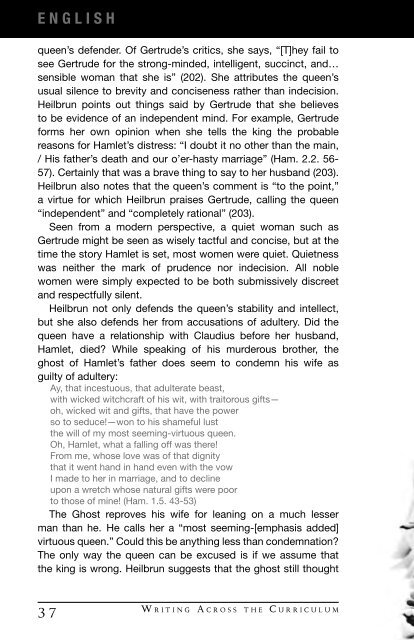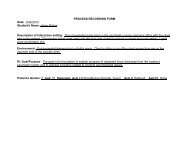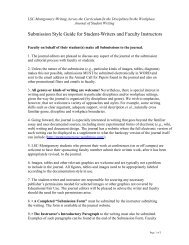2008 - Communication Across the Curriculum (CAC)
2008 - Communication Across the Curriculum (CAC)
2008 - Communication Across the Curriculum (CAC)
Create successful ePaper yourself
Turn your PDF publications into a flip-book with our unique Google optimized e-Paper software.
E n g l i s h<br />
queen’s defender. Of Gertrude’s critics, she says, “[T]hey fail to<br />
see Gertrude for <strong>the</strong> strong-minded, intelligent, succinct, and…<br />
sensible woman that she is” (202). She attributes <strong>the</strong> queen’s<br />
usual silence to brevity and conciseness ra<strong>the</strong>r than indecision.<br />
Heilbrun points out things said by Gertrude that she believes<br />
to be evidence of an independent mind. For example, Gertrude<br />
forms her own opinion when she tells <strong>the</strong> king <strong>the</strong> probable<br />
reasons for Hamlet’s distress: “I doubt it no o<strong>the</strong>r than <strong>the</strong> main,<br />
/ His fa<strong>the</strong>r’s death and our o’er-hasty marriage” (Ham. 2.2. 56-<br />
57). Certainly that was a brave thing to say to her husband (203).<br />
Heilbrun also notes that <strong>the</strong> queen’s comment is “to <strong>the</strong> point,”<br />
a virtue for which Heilbrun praises Gertrude, calling <strong>the</strong> queen<br />
“independent” and “completely rational” (203).<br />
Seen from a modern perspective, a quiet woman such as<br />
Gertrude might be seen as wisely tactful and concise, but at <strong>the</strong><br />
time <strong>the</strong> story Hamlet is set, most women were quiet. Quietness<br />
was nei<strong>the</strong>r <strong>the</strong> mark of prudence nor indecision. All noble<br />
women were simply expected to be both submissively discreet<br />
and respectfully silent.<br />
Heilbrun not only defends <strong>the</strong> queen’s stability and intellect,<br />
but she also defends her from accusations of adultery. Did <strong>the</strong><br />
queen have a relationship with Claudius before her husband,<br />
Hamlet, died While speaking of his murderous bro<strong>the</strong>r, <strong>the</strong><br />
ghost of Hamlet’s fa<strong>the</strong>r does seem to condemn his wife as<br />
guilty of adultery:<br />
Ay, that incestuous, that adulterate beast,<br />
with wicked witchcraft of his wit, with traitorous gifts—<br />
oh, wicked wit and gifts, that have <strong>the</strong> power<br />
so to seduce!—won to his shameful lust<br />
<strong>the</strong> will of my most seeming-virtuous queen.<br />
Oh, Hamlet, what a falling off was <strong>the</strong>re!<br />
From me, whose love was of that dignity<br />
that it went hand in hand even with <strong>the</strong> vow<br />
I made to her in marriage, and to decline<br />
upon a wretch whose natural gifts were poor<br />
to those of mine! (Ham. 1.5. 43-53)<br />
The Ghost reproves his wife for leaning on a much lesser<br />
man than he. He calls her a “most seeming-[emphasis added]<br />
virtuous queen.” Could this be anything less than condemnation<br />
The only way <strong>the</strong> queen can be excused is if we assume that<br />
<strong>the</strong> king is wrong. Heilbrun suggests that <strong>the</strong> ghost still thought<br />
3 7<br />
W r i t i n g A c r o s s t h e C u r r i c u l u m






